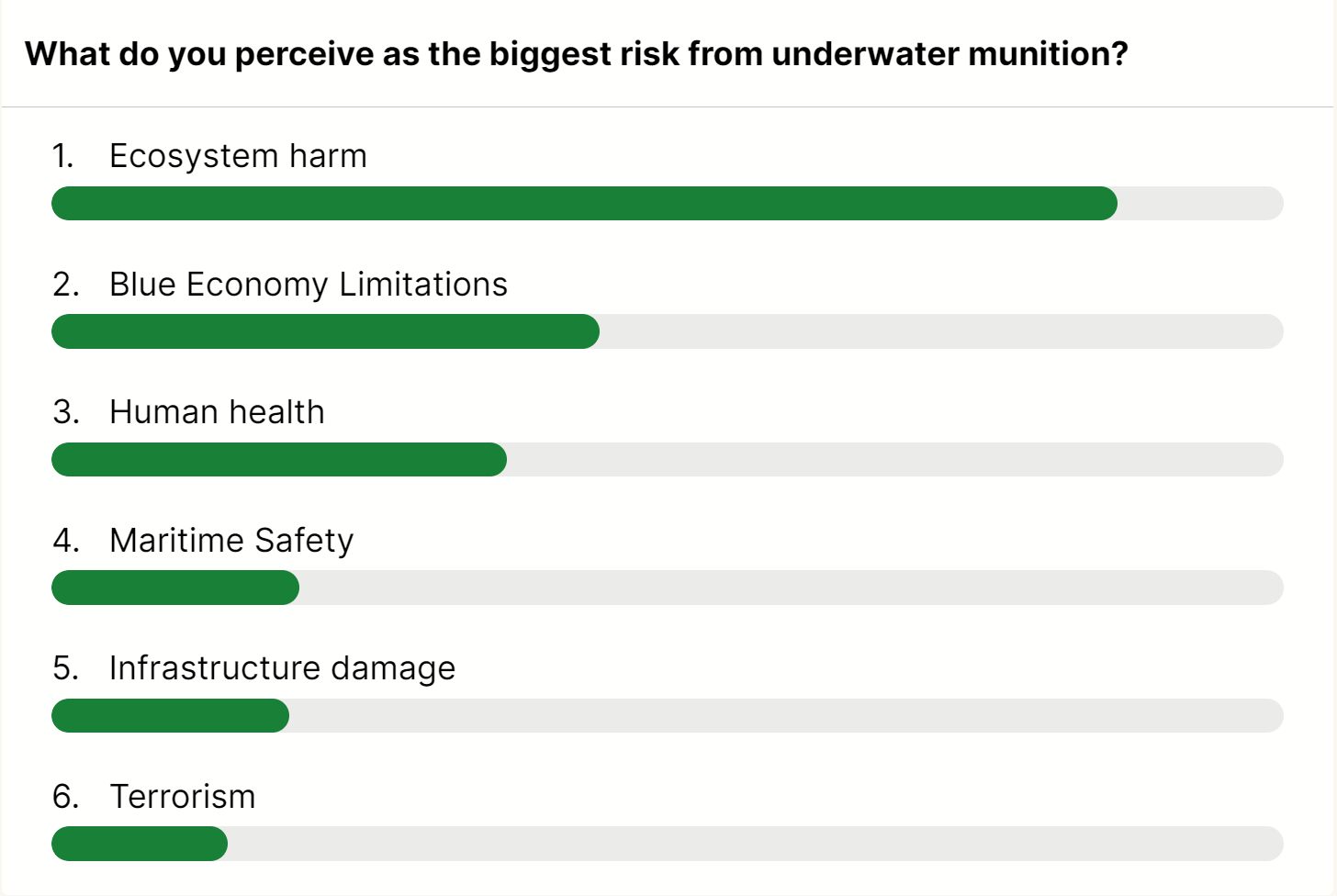The workshop “Beneath the Waves: Confronting unexploded ordnance (UXO)” during the European Maritime Day on 31 May 2024 in Svendborg, Denmark, spotlighted the substantial contributions of JPI Oceans to addressing these challenges. The highlight of the workshop was the formal launch of an information portal, the central product of JPI Oceans‘ Knowledge Hub on Munition in the Sea.
The JPI Joint Action “Munition in the Sea”, launched in 2015, has operated since 2020 as a Knowledge Hub expert group to establish an information portal. The reasons for addressing munition in the sea are manifold. Our ocean and sea basins are littered by large quantities of conventional and chemical munition, posing health and safety risks to humans and the marine environment, as they release toxic and harmful substances. Increasing geopolitical instabilities add further urgency to address the topic with concerted efforts by science, industry, and policy at European trans-national levels. National debates and actions accentuate the momentum. Germany is investing €100 million in a programme starting in July 2024 to develop and test technologies for the remediation of munition from dump sites in the Baltic Sea.
The European Maritime Day 2024 now offered an excellent opportunity to share the outcomes of that process by organising a workshop on the topic of unexploded ordnance (UXO), centred around the formal launch of the portal. The workshop included two introductory talks, followed by a panel discussion with an empty chair for ad hoc discussants from the audience and complemented by slido polls.
- Jella Kandziora, science-policy advisor at JPI Oceans, set the stage to introduce the topic and share insights on JPI Oceans' engagement to put munition in the sea high on the political agenda. With the established Knowledge Hub “Munition in the Sea” experts from JPI Oceans member countries and Ukraine came together to discuss how environmental and safety remediation of UXOs, advancements in detection and removal technologies, exploration of strategies to protect marine ecosystems in munition-affected sea basins and national investments in munitions research, innovation and recovery efforts can be fostered.
- Jens Greinert, Professor at GEOMAR in Germany, provided a keynote, covering the extent and effects of dumped munitions, an overview of past and ongoing research, and an outlook into potential remediation solutions. He believes it is an opportune moment to demonstrate and upscale approaches for the removal of munitions from the sea. To achieve this, requires stronger exchange of practices, better coordination the increasing number of funded international UXO projects, and closer cooperation with navies and coast guard authorities.
- Claus Böttcher, expert lead of the Knowledge Hub information portal, had the honour of introducing and then launching formally the portal. The information portal is bundling key information and best practices to enable a more efficient handling of problematic underwater munition and inform policy and operational activities. The update of the information portal will be ensured through the recently funded EU project MMinE-SwEEPER which is coordinated by Jens Greinert for the next four years.
- Agnieszka Jędruch, Assistant Professor at the Institute of Oceanology of the Polish Academy of Sciences, provided expertise on the impact of submerged UXO on marine biota. She highlighted that the release of harmful substances into the water have been shown to contaminate the marine food chain. Consequently, humans consuming seafood are also exposed. Moreover, climate change exacerbates the issue by speeding up both shell corrosion and chemical biodegradation. These escalating impacts on environmental and human health stress the urgency for action for mitigating risk from underwater munition.
- Christos Economou, DG Mare European Commission, confirmed that UXO is a pressing political issue and already high on the European agenda. The EU Commission will continue pursuing its effort to enable a thriving blue economy by ensuring safe space for much-needed offshore infrastructures such as submarine cables and wind farms. Against this backdrop, Mr. Economou announced that the EU will launch in 2024 a new call to develop and test munition remediation technologies with a budget of €5 million.
Voices of the audience who took the empty chair included Professor Jacek Beldowski, Poland, who highlighted that the problem of UXO extends beyond the North Sea to the Bay of Biscay, the Irish Sea, and globally, emphasising the need for international cooperation on the matter. Pierpaolo Campostrini, Italy, discussed the varying methods of underwater munition clearance across different regions due to different conditions of the seabed. Baruti Likoyi, Belgium, underlined the importance of connecting with relevant stakeholders like the United Nations Institute for Disarmament Research (UNIDIR).
One of the slido polls to foster audience interaction asked which risks from underwater munitions were perceived as most pertinent. Ecosystem harm came clearly out as the biggest concern, followed by limitations for economic activities and negative impacts on human health, while the audience seemed less alarmed about safety and security issues.

The workshop JPI Oceans could benefit from a dynamic discussion, gaining new input and strengthening contacts with new countries as future potential partners. JPI Oceans will continue its endeavours as partner of the EU project MMinE-SwEEPER, where the Knowledge Hub information portal will be a key platform to share information with interested stakeholders. Link to the Knowledge Hub information portal: munitioninthesea.eu